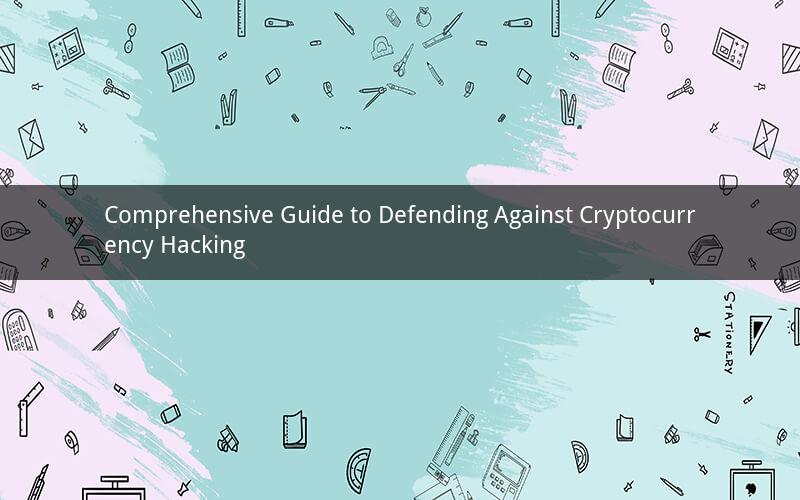
In the digital age, cryptocurrencies have emerged as a revolutionary form of digital currency, offering individuals and businesses unparalleled security and flexibility. However, the increasing popularity of cryptocurrencies has also attracted malicious actors who seek to exploit vulnerabilities and steal valuable assets. As a result, it is crucial to understand how to defend against cryptocurrency hacking. This comprehensive guide will provide insights into the various methods of protecting your digital assets from cyber threats.
1. Secure Your Wallet
One of the primary targets of cryptocurrency hackers is digital wallets, which store private keys and enable access to your cryptocurrency holdings. To secure your wallet, follow these steps:
a. Use a hardware wallet: Hardware wallets are considered the most secure form of storage, as they store your private keys offline, away from potential cyber threats.
b. Choose a reputable software wallet: If you opt for a software wallet, ensure that it is from a trusted source and has undergone rigorous security audits.
c. Enable two-factor authentication: Adding an extra layer of security by enabling two-factor authentication can help prevent unauthorized access to your wallet.
d. Regularly update your wallet software: Keeping your wallet software up-to-date ensures that you have the latest security patches and protection against known vulnerabilities.
2. Implement Strong Passwords
Weak passwords are an open invitation for hackers to gain access to your cryptocurrency assets. To enhance your security, follow these password best practices:
a. Use a unique password for each account: Avoid reusing passwords across multiple platforms, as this increases the risk of a single breach compromising all your accounts.
b. Create a strong password: Utilize a mix of uppercase and lowercase letters, numbers, and special characters to create a password that is difficult to guess.
c. Use a password manager: Password managers can help you generate and store complex passwords securely, reducing the likelihood of forgetting them.
3. Stay Informed About Phishing Scams
Phishing scams are a common method used by hackers to obtain sensitive information, including cryptocurrency private keys. To avoid falling victim to these scams:
a. Be wary of unsolicited emails, messages, or calls asking for your personal or financial information.
b. Verify the authenticity of any requests for cryptocurrency transactions or private key sharing.
c. Do not click on suspicious links or download attachments from untrusted sources.
4. Utilize Multi-Signature Transactions
Multi-signature transactions require multiple private keys to authorize a transaction, adding an additional layer of security. To implement multi-signature transactions:
a. Use a multi-signature wallet: These wallets enable you to control your cryptocurrency assets while ensuring that transactions require multiple approvals.
b. Share private keys with trusted individuals or organizations: By distributing private keys among multiple parties, you reduce the risk of losing access to your assets due to a single point of failure.
5. Regularly Monitor Your Accounts
Keeping a close eye on your cryptocurrency accounts can help you detect and respond to suspicious activity promptly. Here's how to monitor your accounts effectively:
a. Enable notifications: Set up alerts for any unusual transactions or account activities, allowing you to act quickly in case of a breach.
b. Use blockchain explorers: Blockchain explorers can help you track transactions and monitor the status of your assets, providing valuable insights into any suspicious activity.
c. Perform regular audits: Conduct periodic audits of your cryptocurrency assets to ensure that they are secure and that no unauthorized transactions have occurred.
Frequently Asked Questions:
1. How can I determine if my cryptocurrency wallet has been hacked?
If you notice any of the following signs, your wallet may have been compromised:
a. Unusual transactions or withdrawals
b. Unrecognized addresses in your transaction history
c. Unresponsive wallet interface
d. Missing or stolen cryptocurrency assets
2. Should I store all my cryptocurrency in one wallet?
No, it is advisable to distribute your cryptocurrency across multiple wallets, including hardware, software, and multi-signature wallets, to minimize the risk of losing all your assets in a single breach.
3. Can two-factor authentication protect my cryptocurrency assets?
Yes, two-factor authentication can significantly enhance the security of your cryptocurrency assets by adding an extra layer of verification to prevent unauthorized access.
4. How often should I update my cryptocurrency wallet software?
It is crucial to keep your wallet software up-to-date with the latest security patches. Check for updates at least once a month and apply them promptly.
5. Is it possible to recover my cryptocurrency if it has been stolen?
Recovering stolen cryptocurrency can be challenging, as there is no centralized authority to reverse transactions. However, you can try the following steps:
a. Contact the wallet provider or exchange where your assets were stolen
b. Report the incident to law enforcement and cryptocurrency communities
c. Utilize blockchain explorers to track the movement of your stolen assets